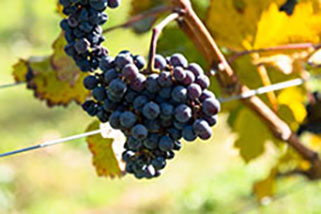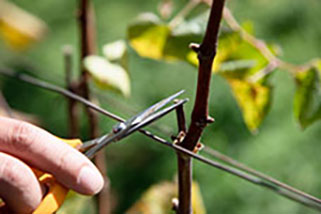Policies and Our Approach
An ongoing stable supply of products will be difficult if the effects of global warming more drastically change the climate patterns as well as greatly impact water resources, which are crucial for beverage manufacturers. The Suntory Group recognizes global warming as one of the major challenges in business continuity due to the potential risk for great increases in production costs caused by a depletion of resources. Therefore, we need to unify as a Group to prevent global warming with the goal of reducing the environmental impact throughout the entire value chain by joining the environmental efforts of governments and local municipalities and by supporting public policy and regulations aimed to mitigate global warming. In May 2019, the Suntory Group expressed its support for the Task Force on Climate-related Financial Disclosures (TCFD) recommendations established by the Financial Stability Board (FSB).
Promoting Structure
Global Sustainability Committee
To promote sustainability management, the Global Sustainability Committee (GSC) acts as an advisory committee to the Board of Directors. The Group’s sustainability strategies and the progress on priority themes (water, climate change, containers and packaging, raw ingredients, health, human rights and enriching life) are discussed in the GSC under the lead of the Chief Sustainability Officer
For more information on the Global Sustainability Committee, see Environmental Management.
Targets and Progress
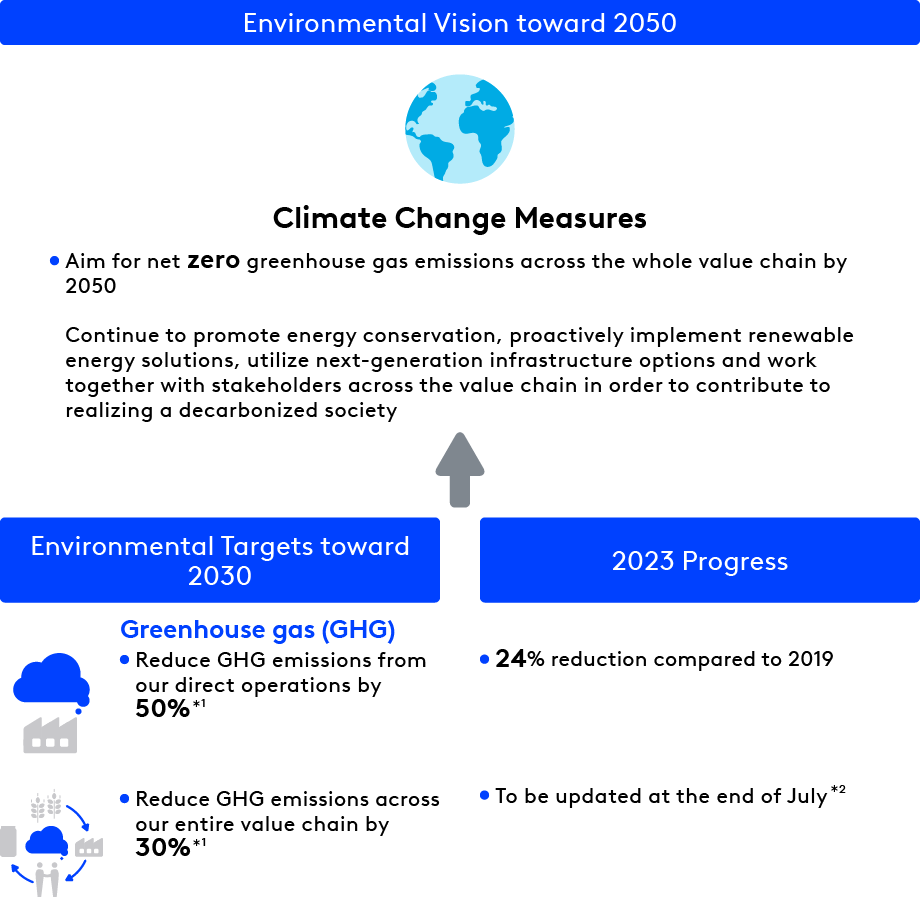
-
*1Based on emissions in 2019.
-
*2(Reference) 2022 Progress
Direct operations: 16.9% reduction
Entire value chain: 3.5% reduction
For more information on GHG emissions achievements, see the List of achievements data.
SBT Initiative Certification
The Suntory Group has signed the “Business Ambition for 1.5℃,” a campaign led by the Science Based Targets initiative*1 in partnership with the UN Global Compact and the We Mean Business*2 coalition to hold global temperature increases to 1.5℃ above pre-industrial levels.
The Suntory Group has had its 2030 emissions reduction targets approved by the Science Based Targets initiative as consistent with levels required to meet the goals of the Paris Agreement.

-
*1The SBTi is a partnership between CDP, the United Nations Global Compact, World Resources Institute (WRI) and the World Wildlife Fund for Nature (WWF). It drives ambitious climate action in the private sector by enabling companies to set science-based emissions reduction targets.
-
*2We Mean Business is a global nonprofit coalition working with the world's most influential businesses to take action on climate change. Together they catalyze business leadership to drive policy ambition and accelerate the transition to a zero-carbon economy.
Endorsement of Task Force on Climate-related Financial Disclosures (TCFD) Recommendations
The Suntory Group has declared its Endorsement of Task Force on Climate-related Financial Disclosures (TCFD) recommendation, which was established by the Financial Stability Board (FSB).

In addition, we conducted scenario analysis for climate change according to the recommendations of the TCFD and learned about the possibility that climate change will have a significant impact on the crops that are Important ingredient to the Suntory Group. From here on, we will do further advance scenario analysis and expand disclosure of information related to the risks and opportunities that climate change poses to business.
Our Initiatives
Internal carbon price
The Suntory Group introduced internal carbon pricing to from 2021 and plan to invest a total of approximately 100 billion yen by 2030 to promote decarbonization. The company estimates that these actions together will amount to a reduction of approximately 1 million tons of greenhouse gas (GHG) emissions in its direct operations compared to a business-as-usual projection for 2030.
Initiatives in Production and R&D
Use of Renewable Energy
The Suntory Group uses 100% renewable energy for electric power purchased at all of its alcohol and non-alcohol manufacturing sites and R&D facilities in Japan, the Americas, and Europe. This policy contributes to an annual reduction of approximately 230,000 tons* of GHG emissions.
In addition to procured power, we are installing solar panels and introducing biomass boilers as required to generate renewable energy on site.
-
*Based on power procured, 2021
-

Suntory Minami Alps Hakushu
Water Plant -

Suntory Kita Alps Shinano-no-Mori
Water Plant -

Carcaixent Plant (Spain)
-

Biomass boiler
(Chita Distillery) -

Biomass boiler
(Suntory Kita Alps Shinano-no-Mori Water Plant) -
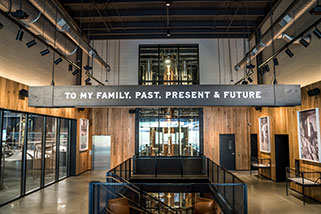
Fred B. Noe Craft Distillery
(Beam Suntory, North America)
Installing Japan's largest 16-megawatt P2G (Power to Gas) system for in-house green hydrogen production
On September 5, 2022, Suntory Holdings Ltd. signed a basic agreement with Yamanashi Prefecture for realizing an environmentally harmonious and sustainable society. Suntory will collacorate with Yamanashi Prefecture on decarbonizing Suntory Hakushu Distillery and Suntory MInami Alps Hakushu Water Plant by installing the Yamanashi Model Power to Gas (P2G)System* at the company's Hakushu facilities by 2025. This will constitute Japan's largest green hydrogen production system, and does not emit any greenhouse gas (GHG). The green hydrogen produced will not only be used as fuel for heat energy at the company’s Hakushu facilities, but are also planned to be utilized in the surrounding communities.

Governor Kotaro Nagasaki (Yamanashi Prefecture) and then-Managing Executive Officer Makiko Ono (Suntory Holdings) (2022)
Promoting Energy Conservation
At Suntory Spirits Ltd. Gunma Brewery, expanion of beer production capacity has boosted energy efficiency by about 20%. The Tequila Sauza Plant in Mexico has been selected for the Financing Programe for JCM Model Projects in 2016 that contributes to reducing GHG emissions for its initiatives to improve heat recovery rate and the installment of once-through boilers.
In addition, a wide range of energy conservation initiatives are underway at locations such as the Suntory World Research Center, which utilizes natural energy actively and has introduced equipment to reduce its environmental impact, and Iwanohara Vineyard, which takes advantage of its location in an area with heavy snowfall to control wine fermentation and storage temperatures by using a “snow room” that stores winter snow throughout the year.
-

Suntory Spirits Ltd. Gunma Brewery
-

Newly installed boiler at the
Beam Suntory Sauza Plant in Mexico -

Suntory World Research Center
-

Snow room at Okudaisen Bunanomori
Water Plant of Suntory Products Ltd.
Suntory Group’s first net-zero CO2 Emissions plant in Japan
The Kita Alps Shinano-no-Mori Water Plant (Omachi City, Nagano Prefecture) which started operation in May 2021 as a fourth water source for Suntory Tennensui Mineral Water, become the Suntory Group’s first net-zero CO2 Emissions plant in Japan through adoption of solar power generation facility and boilers which use biomass fuel, electric power procurement derived from renewable energy as well as offsetting.
In June 2023, the Kita Alps Shinano-no-Mori Water Plant has been proved to be a carbon-neutral facility after receiving a PAS2060*1 verification from the British Standards Institution (BSI). This is the first verification received by a food & beverage factory in Japan.
-
*1Abbreviation for Publicly Available Specification 2060, an international standard issued by BSI to quantify, reduce, and carbon offset greenhouse gas (GHG) emissions from products/services/activities, thereby declaring them neutral (i.e., emissions of GHGs are effectively zero).

Initiatives in Logistics
The Suntory Group is working to reduce the environmental impact of its logistics operations, including transport and delivery operations and warehouse operations.
We are working to shorten transport and delivery distances traveled from plants to customers by promoting local production for local consumption, maximizing utilization of large vehicle load capacity, and switching to next-generation fuels and transport modes with lower GHG emission levels.
In warehouse operations, we are working to shorten operating hours and reduce power consumption.
During 2022, sales (KL) expanded by 7% over the previous year. GHG emissions rose 9% to 150,000 CO2-tons* while the basic unit was 22.7 CO2-ton/thousand KL sold.
-
*Due to a supply/demand mismatch caused by extremely high summer temperatures, transportation distances and frequency of travel increased.
Reducing GHG Emissions with a Modal Transport Shift
Enhancing the modal shift rate
We are promoting a modal shift to rail and ocean transport, which emits less GHG than trucks. The 2022 modal shift rate rose over the previous year.
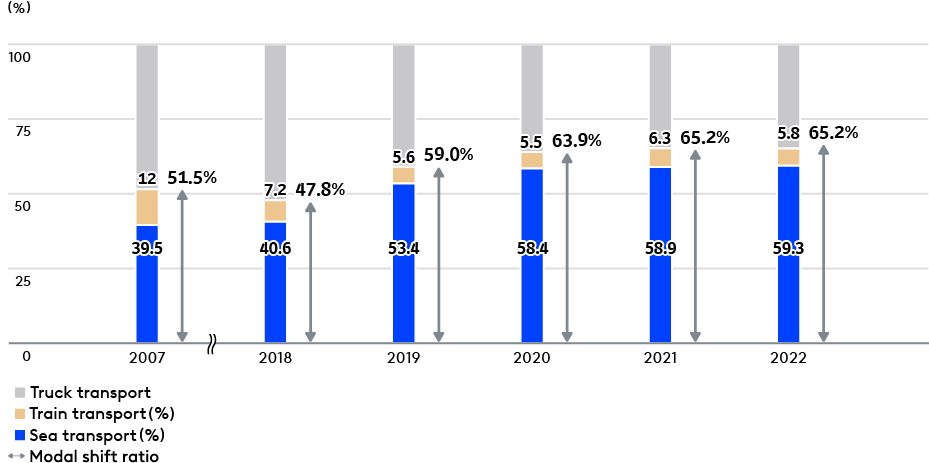
Enhancing usage of fuels with less GHG emissions
To encourage our transportation partners to use next-generation fuels that emit less GHGs than conventional fuels, we identified issues for expanded use in the future and are engaged in discussions for solving those issues. In 2022, a total of four companies used renewable fuels.
Collaborative Efforts with Logistics Affiliates
201 of our logistics affiliates (as of2021) have acquired certifications, such as the ISO14001 (52 sites) and Eco Stage (23 sites) as well as Green Management advocated by the Ministry of Land, Infrastructure, Transport and Tourism, with the aim to further reduce the environmental impact. In addition, in response to amendments to the Rationalization in Energy Use Law, the Suntory Group collected GHG emissions data such as the monthly distance driven by vehicles, the amount of fuel consumed, and the useful load of logistics affiliates.
Collaborative Efforts with Other Companies
We are partnering with other companies for reducing environmental impact in logistics through joint distribution and joint use of containers.
| Coordination | Description | Starting from | Results |
|---|---|---|---|
| NISSIN FOODS HOLDINGS CO., LTD. | Joint transport in the Obihiro area of Hokkaido | June 2017 | Approximate annual GHG reduction of 50 tons (Total figures for both companies) |
| Four major beer companies in Japan | Joint distribution in some areas of Hokkaido (Kushiro/Nemuro) | September 2017 | Reduction of approximately 330 tons of GHG emissions per year (*Figures apply to all four beer companies) |
| Four major beer companies in Japan | Joint distribution for transport between Kansai/Chugoku area and Kyushu area | April 2018 | Reduction of approximately 1,500 tons of GHG emissions per year (*Figures apply to all four beer companies) |
| Four major beer companies in Japan | Joint collection of beer pallets | November 2018 | Reduction of approximately 4778 tons of GHG emissions per year (*Figures apply to all four beer companies) |
| Unicharm Corporation | Joint use of railway containers between Shizuoka area and Fukuoka area | February 2021 | Reduction of approximately 2 tons of GHG emissions per year (*Total figures for both companies) |
| Daio Logistics Co., Ltd. | Joint Kanto-Kansai transport | August 2022 | Approximate annual GHG reduction of 115 tons (*Two-company total) |
| Daio Logistics Co., Ltd. | Parties share one-way rail containers | August 2022 | Approximate annual GHG reduction of 100 tons |
| Daio Logistics Co., Ltd. | Railroad Container Round-trip Utilization between Kanto and Shikoku | June 2023 | Approximate annual GHG reduction of 31 tons |
| Japan Freight Liner Company | Utilization of ocean 40ft containers for return trips | July 2023 | Approximate annual GHG reduction of 89 tons |
Energy Conservation in Vending Machines
We are implementing various initiatives to save energy in vending machines in Japan as one of priority initiatives to reduce GHG in the entire value chain.
Key Features of Suntory Vending Machines
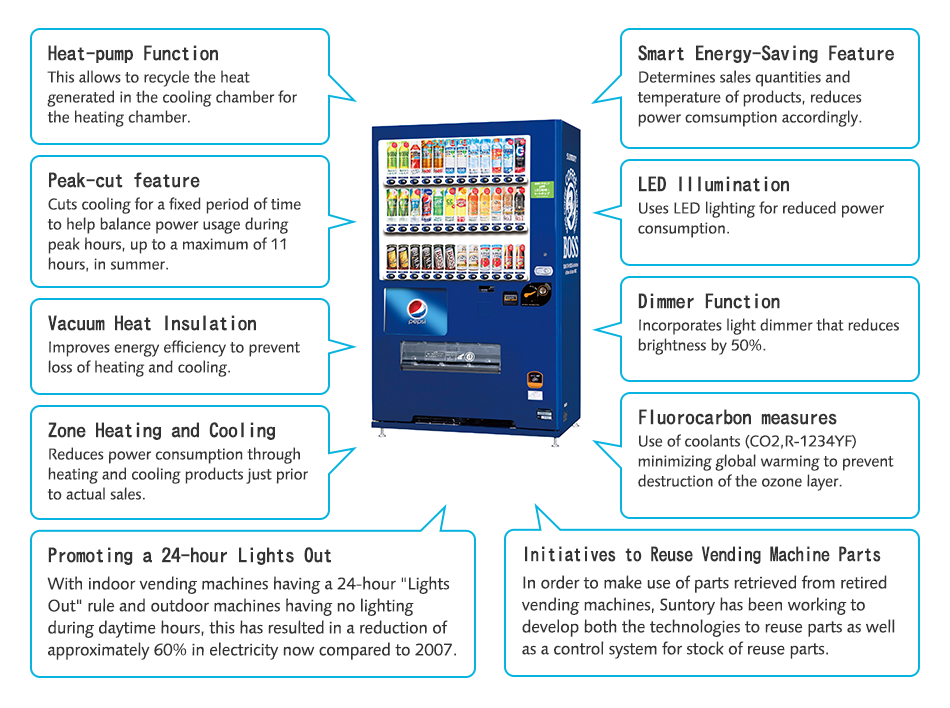
What is a heat-pump vending machine?
A heat-pump vending machine in Japan is a vending machine with a built in system to collect heat generated by the cooling chamber for the heating chamber. These vending machines largely contribute to energy saving through function to effectively use heat inside the vending machine and latest machine can even exchange heat with the atmosphere.
-
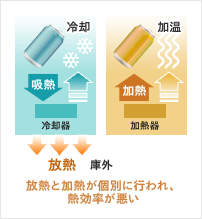
Vending machines prior
to heat-pump type -
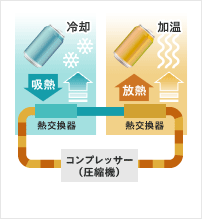
Heat-pump vending machine
Ensuring Reasonable Waste Disposal of Vending Machines
We are leading the industry in building a Vending Machine Waste Disposal System that collects and recycles vending machines to throw away, which we have expanded nationally since January 1997. We are strictly managing disposal from the initial selection of vending machines to discard to the final disposal in compliance with the revisions to the Wastes Disposal and Public Cleansing Act in April 2001. We are properly processing broken machines by understanding the amount of machines to collect based on the Act for Rationalized Use and Proper Management of Fluorocarbons even in regards to the fluorocarbons that are used as a refrigerant in vending machines.
Initiatives in Offices and Other Facilities
Actions in the Offices
Our major offices purchase 100% renewable electricity. In addition, various initiatives are carried out by all employees daily with higher awareness on saving energy in each office. The Odaiba Office in Tokyo installs use of reused water, automatic lighting control system, and human detection sensors for lights in toilets and escalators. Reduction of greenhouse gas(GHG) emission are being promoted in each office by implementing cool biz and warm biz and actively using web conference system.
Suntory Hall and Suntory Museum of Art Purchase 100% Renewable Electricity
From April 2022, the Suntory Group purchases 100% renewable electricity for all 30 directly owned manufacturing sites and R&D facilities in Japan. Suntory Hall and Suntory Museum of Art have also switched to purchasing 100% of their electricity from renewable energy sources. Through these efforts, the two facilities have been able to reduce CO2 emissions by approximately 800 tons per year compared to the past.
Reducing Environmental Impact of Sales Vehicles and Vehicle Accidents
We are proactively saving energy by replacing most of the vehicles used in our sales activities with hybrid vehicles.
In addition, by introducing vehicle operation management systems and drive recorders that can acquire driving data such as driving distance, driving behavior, and fuel efficiency in sales vehicles. We promote safe driving and eco-driving by feeding back the result of the analysis of collected data.
Initiatives in Raw Ingredients
The Suntory Group is working to mitigate the impact of climate change on its business with respect to raw ingredients, including green tea and blackcurrant.
Green Tea
To promote sustainable tea leaf procurement, the raw material for green tea beverages, the Suntory Group has launched a long-term initiative in collaboration with tea farming areas.
By working with the Kuma Regional Agricultural Cooperative (JA Kuma) to introduce environmentally friendly tea farming processes, we have reduced GHG emissions by over 30%* compared to conventional processes.
In conjunction with the pursuit of high-quality tea production, we hope to go on contributing to stable succession and training of successors in tea farming regions.
-
*GHG emitted per weight unit during the production of green tea material, from raw leaves to rough tea

Blackcurrant
Suntory Beverage & Food Great Britain and Ireland has been conducting research on new, climate change-resistant species of blackcurrant. In July 2020, after years of research in collaboration with the James Hutton Institute, an agricultural research facility, we harvested a new climate change-resistant species, named Ben Lawers.
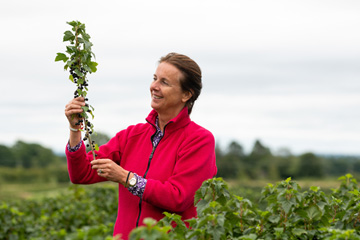
Wine Grapes
In collaboration with University of Yamanashi, Suntory Tominooka Winery has introduced a new, secondary-shoot cultivation technique for wine grapes. The daily temperature range normally begins to expand as nighttime temperatures start to drop around mid-July, causing the sugar content of grapes to increase as they ripen. However, climate warming has recently slowed the ripening process. In secondary-shoot cultivation, the tips of shoots that sprout in April are trimmed, and the resulting side shoots are nurtured. This shifts the start of ripening from mid-July to early September, when temperatures start to drop, and grapes are harvested in mid-November.
In other vineyard initiatives, we are promoting formation of soil rich in biodiversity by minimizing the use of pesticides and fertilizer. This boosts the population of microorganisms and beneficial insects in the soil and decreases the population of pests. We also store carbon by carbonizing pruned branches and mixing them into the soil.
For more information on our raw material initiatives, see Supply Chain Management


